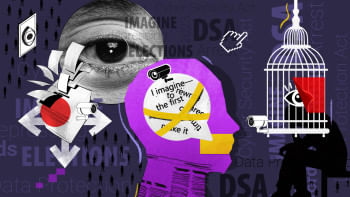What's the civil society's stake in strengthening democracy?

"Democracy, good governance, and modernity cannot be imported or imposed from outside a country"—the words of former Lebanese President Émile Lahoud resonate deeply in present-day Bangladesh. The country has witnessed significant Western interest recently in issues related to Bangladesh's democracy, human rights, elections, and the rule of law. Interestingly, the Eastern blocs also engage in these discussions, offering contrasting perspectives. What's notable, however, is the relatively muted engagement of the nation's own civil society representatives in these debates. While they express their perspectives to foreign delegations, their local participation remains reserved, prompting questions about the underlying reasons for this apparent public aloofness.
The recent scrutiny of the widely discussed US visa policy for Bangladesh highlights the shared responsibility for free and fair elections, a crucial element for democratic governance, stressing the need for active participation from voters, political parties, the government, security forces, civil society, and the media. This underscores the need for impartial and open-minded civil society leaders within Bangladesh to play a more active role in addressing the nation's political challenges effectively. Now, the pressing question arises: where is Bangladesh's once-vibrant civil society, historically pivotal in crucial moments? Should the mantle of nurturing democracy rest solely on political parties?
Globally, the shrinking of civic spaces is a concerning trend, and Bangladesh is no exception. In the recent report by CIVICUS, a global civil society alliance, Bangladesh's civic space has been downgraded to the "closed" category, marking it with the worst rating possible. After lingering in the "repressed" category for several years, the country was placed on the "watchlist" last year and has now further declined, joining the ranks of nations with severely restricted statuses in Asia, alongside Afghanistan, China, Hong Kong, Laos, Myanmar, North Korea, and Vietnam. The report, titled "People Power Under Attack 2023," cites an escalating crackdown on the opposition, activists, journalists, and dissenting voices in Bangladesh ahead of the national elections on January 7 as the reason for this downgrade. These findings underscore the alarming erosion of civic freedoms in Bangladesh, emphasising the critical need to protect the space for civil society engagement and uphold the fundamental principles of democracy and open dialogue.
The ongoing trend of diminishing civic space and democracy backsliding in Bangladesh is a long-standing issue. A recent study by The Asia Foundation, involving prominent civil society organisations (CSOs) from Bangladesh, Nepal and Sri Lanka, echoes the observations of CIVICUS and other civil rights groups. While these nations experience a significant reduction in civic spaces, particularly for CSOs focusing on human rights, anti-corruption initiatives, transparency and accountability, Bangladesh stands at the forefront in suppressing civic freedoms among its neighbouring countries. The study paints a troubling picture, revealing that about two-thirds of Bangladeshi respondents face heightened obstacles in upholding individual rights and freedoms. Intriguingly, CSOs in Bangladesh face relatively fewer impediments when engaged in activities related to healthcare, education, women's empowerment, and public service delivery.
The flourishing of a democratic state hinges on the embodiment of values like tolerance, generosity and respect, especially towards minority groups. Civil society institutions are integral to this societal transformation, playing a crucial role in building a strong democratic foundation. As the world observes Bangladesh grapple with challenges related to democracy, human rights, and the rule of law, the nation's civil society leaders must step forward to address the prevailing political impasse. Additionally, civil society institutions in Bangladesh must reclaim their impartial and principled position, free from any political biases. If they can successfully do so, even a repressive state system will be unable to undermine civil society.
Analysing the reasons for shrinking civic spaces in Bangladesh and the increasing fragility of civil society institutions reveals that CSOs have encountered challenges in maintaining their anticipated roles of neutrality and impartiality. Instead, a portion of them has become entangled in political ideologies and partisan interests. Bangladesh's civil society has a storied history, making a lasting impact on global and national development. These organisations play a pivotal role in a wide range of initiatives, including poverty alleviation, disaster response, education, and healthcare. Moreover, they stand as staunch advocates for democracy, human rights, good governance, and transparency. The fortification of democracy in Bangladesh hinges on the collaborative efforts of various societal components, even though this diverse democratic approach faces challenges. Major political parties have sometimes viewed civil society as opposition, yet these organisations remain an essential part of society, safeguarding human rights and nurturing democracy.
It's crucial for civil society to maintain independence, promote civic education, and contribute to informed decision-making, as the weakening of civic institutions often stems from political entanglements and perceptions of adversarial roles, resulting in the shrinking of the civic space in Bangladesh.
In contemporary society, the relationship between the government and its citizens has evolved into more of a "give-and-take" dynamic. In such scenarios, civil society institutions serve as a vital bridge connecting these two spheres: the government and the populace. Within a democratic system, it is imperative to acknowledge that the government does not assume ownership of the state; instead, it functions as a temporary custodian designated by the people for a specific tenure. Their primary responsibility is to act in the best interests of the nation and operate the state apparatus with transparency. In such a dynamic, CSOs, along with the media, play a crucial role as effective and comparable social watchdogs, responsible for monitoring the regular activities of the government. Their mission aligns with the core principles of democratic governance, wherein government representatives are entrusted with the responsibility of serving the people's interests and ensuring the public's welfare.
The flourishing of a democratic state hinges on the embodiment of values like tolerance, generosity and respect, especially towards minority groups. Civil society institutions are integral to this societal transformation, playing a crucial role in building a strong democratic foundation. As the world observes Bangladesh grapple with challenges related to democracy, human rights, and the rule of law, the nation's civil society leaders must step forward to address the prevailing political impasse. Additionally, civil society institutions in Bangladesh must reclaim their impartial and principled position, free from any political biases. If they can successfully do so, even a repressive state system will be unable to undermine civil society. US President Joe Biden once emphasised, "No fundamental social change occurs merely because government acts. It's because civil society, the conscience of a country, begins to rise up and demand – demand – demand change."
This is the opportune moment for our civil society leaders to rise to the occasion.
Asinur Reza is senior programme officer, South Asia Governance Program at The Asia Foundation. He can be reached at [email protected].
Views expressed in this article are the author's own.
Follow The Daily Star Opinion on Facebook for the latest opinions, commentaries and analyses by experts and professionals. To contribute your article or letter to The Daily Star Opinion, see our guidelines for submission.

 For all latest news, follow The Daily Star's Google News channel.
For all latest news, follow The Daily Star's Google News channel. 









Comments